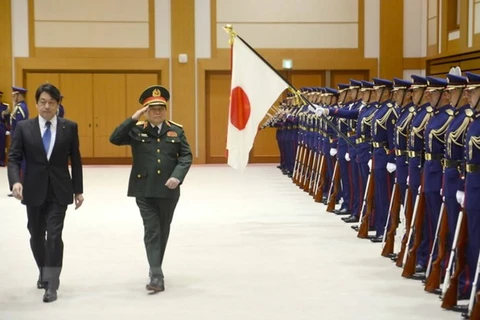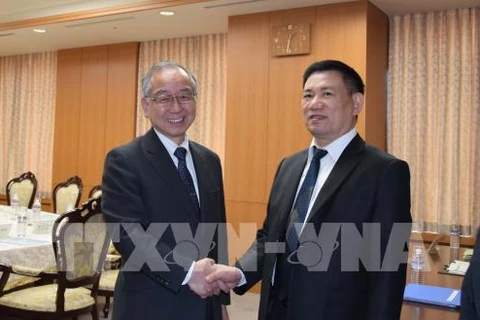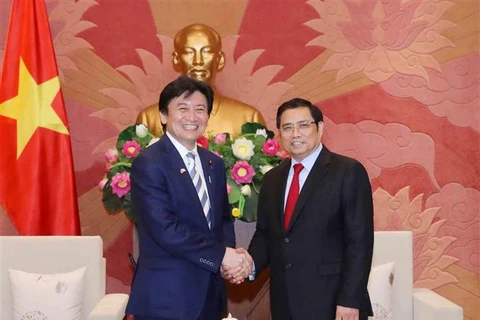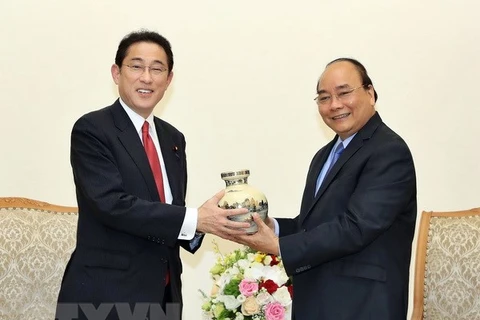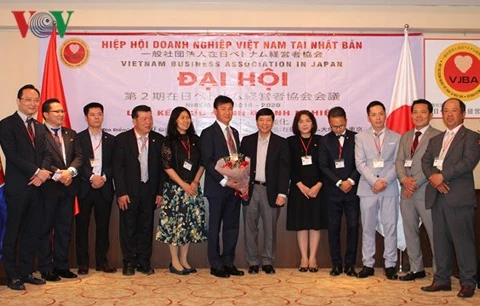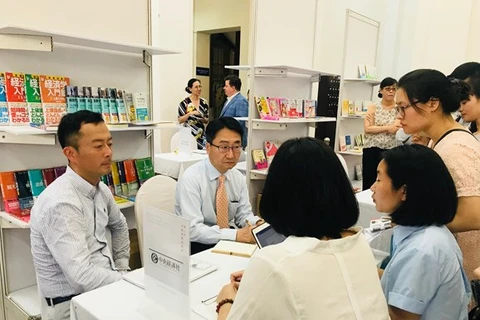Hanoi (VNA) – The strategic partnership between Vietnam and Japan is expected to enter a new period of development in the coming time, especially in the fields of trade, economy, defence-security, health, high technology, locality-to-locality cooperation, and people-to-people exchanges.
President Tran Dai Quang expressed the belief in an interview granted to Japanese media including NHK broadcasting organisation, Kyodo News, Jiji Press and Nikkei newspaper in Hanoi on May 25, ahead of his State-level visit to Japan from May 29 to June 2.
The President said he was glad to lead a high-level Vietnamese delegation to Japan on the occasion of the 45th founding anniversary of the two countries’ diplomatic ties.
The visit is expected to take the bilateral extensive strategic partnership into a new period of development, contributing to prosperity in each country and to peace, cooperation and development in Asia and beyond, he said.
President Quang said during the visit, the first State-level visit made by Quang as President of Vietnam, he is scheduled to meet the Japanese Emperor and Empress and hold talks with Prime Minister Shinzo Abe. He will also have meetings with Japanese top legislators, politicians, economists, scientists and cultural workers to discuss directions and major measures to increase political trust and boost cooperation in trade, investment, development cooperation, defence, security, culture, and people-to-people exchanges.
He added that the two sides will talk about coordination at regional and international forums and issues of mutual concerns, especially as Vietnam will be the coordinating country for ASEAN-Japan relations in 2018-2021.
The Vietnamese President highlighted Vietnam-Japan long-standing connection in history, culture and trade, which dated back to the 15th century when the trade port of Hoi An in Vietnam welcomed the first Japanese merchant ships. The Japanese street in Hoi An then was a major trade centre connecting Japan with other countries in Southeast Asia.
After the establishment of diplomatic ties in September 1973, the bilateral friendship and cooperation have developed strongly in all realms, especially after the elevation of ties to an extensive strategic partnership for peace and prosperity in Asia in March 2014, President Quang said.
Politically, the two countries have reached mutual trust through regular meetings of high-ranking officials. In 2017 alone there were five high-level visits between the two countries, including the first historical visit to Vietnam by the Japanese Emperor and Empress. The same year, Japanese Prime Minister Shinzo Abe visited Vietnam twice while Speaker of the House of Representatives of Japan Oshima Tadamori visited Vietnam after 15 years. Prime Minister Nguyen Xuan Phuc also paid an official visit to Japan in June.
Economically, Japan is a leading partner of Vietnam, the largest provider of official development assistance (ODA), and the fourth biggest trade partner of Vietnam.
Last year, Japan became the top foreign investor in Vietnam with a record investment capital of over 9.1 billion USD, four times over the figure in 2016.
At present, more than 2,500 Japanese businesses, including most major corporations of Japan, are investing in Vietnam.
Japan’s ODA capital has been effectively used in building infrastructure, developing high technology, clean agriculture, climate change adaptation, and poverty reduction, which makes significant contributions to Vietnam’s socio-economic development.
Bilateral cooperation in other fields such as defence, security, culture, education-training, tourism, and people-to-people exchanges has been continuously reinforced and expanded.
Thirty-seven pairs of localities of Vietnam and Japan have signed cooperation agreements.
In 2017, Japan ranked third in the number of tourists to Vietnam. The Vietnamese culture festival in Japan and the cherry blossom festival in Vietnam have become annual much-awaited events for the two peoples.
Vietnam and Japan also closely cooperate at regional and international forums such as the United Nations, ASEAN , Asia-Pacific Economic Cooperation (APEC) Forum, and Asia-Europe Meeting (ASEM).
Particularly, the two countries worked together for the success of the APEC Year 2017 in Vietnam, the 25th APEC Economic Leaders’ Meeting in Da Nang, and jointly pushed ahead negotiations to reach the signing of the Comprehensive and Progressive Agreement for Trans-Pacific Partnership (CPTPP).
According to President Tran Dai Quang, the thriving economic ties between Vietnam and Japan have brought about practical benefits to people of the two countries.
To better utilise potential and strengths of each other, the two sides should enhance economic connectivity through promoting trade and investment, and work together to effectively implement the Vietnam-Japan economic partnership agreement, he said.
The leader called for joint efforts to double trade and investment value in 2020 as compared with 2014, facilitate the market access of each other’s farm produce and seafood and effectively implement the Vietnam-Japan Joint Initiative in order to improve investment environment and promote Japanese investment inflows in Vietnam, especially in high-tech, infrastructure and energy sectors, thus maintaining Japan’s position as the No. 1 foreign investor in Vietnam.
He said the two countries should join hands in realising action plans for the six key industries selected under Vietnam’s industrialisation strategy within the Vietnam-Japan cooperation framework by 2020 with a vision towards 2030, which are automobile and auto spare parts, farming machines, agro-fishery product processing, shipbuilding, electronics, environmental industry and energy saving.
Vietnam also hopes for Japan’s active cooperation in developing the support industry in the country, President Quang said, calling on the country to maintain its official development assistance to Vietnam, particularly in infrastructure construction, high-quality human resources development, climate change response, environmental protection, economic management capacity improvement, the implementation of large-scale projects, economic reform and sustainable development.
“We wish that Japan considers Vietnam a priority partner of the ‘Partnership for Quality Infrastructure’ programme worth 200 billion USD and the Mekong-Japan Connectivity Initiative worth 6.8 billion USD,” he said.
Vietnam also looks for enhanced partnerships with Japan in the areas of the two countries’ demands and potential like high-tech agriculture, health care, culture, education and cooperation between localities.
President Quang said along with the sound development of bilateral relationship, Vietnam –Japan cooperation at regional and international forums, especially in major cooperative mechanisms like the UN, the Asia-Pacific Economic Cooperation (APEC), the Asia-Europe Meeting (ASEM) and the ASEAN Plus has been tightened, significantly contributing to peace, stability, cooperation and development in the region and the world at large.
The two sides have actively promoted trade liberalisation, while closely coordinating with each other to push ahead the negotiations and signing of the CPTPP agreement, and negotiations of the Regional Comprehensive Economic Partnership (RCEP).
Vietnam supports Japan in playing an active role and contributing to regional peace, stability and development, he said.
He noted that the two sides have regularly discussed regional and international issues of shared concern and supported each other’s bids to run for seats at UN agencies and other international organisations.
The two countries have also shared viewpoints and coordinated to help address issues relating to cooperation, development and security in the region, including the East Sea issue, denuclearization on the Korean peninsula and the Indo-Pacific initiative.
Both sides stressed the significance of ensuring peace, security, safety and freedom of aviation and navigation in the East Sea, resolving disputes by peaceful measures and in line with international law, including the 1982 United Nations Convention on the Law of the Sea, fully and effectively implementing the Declaration on the Conduct of Parties in the East Sea (DOC) in 2002 and working towards a Code of Conduct in the East Sea (COC).
As the coordinating country for the ASEAN-Japan relationship from August 2018-Agust 2021, Vietnam wishes that the two countries will continue to cooperate at regional and international forums, especially within the ASEAN-Japan cooperation framework, further contributing to peace, security, stability and prosperity in the region and the world as well, the leader noted.
The CPTPP, signed by 11 countries in Santiago, Chile on March 8 this year, delivers a common message of the member states who support regional economic linkage, President Quang said, adding that free trade and economic integration will continue to be a mainstream trend in the Asia-Pacific.
He said Vietnam’s joining in CPTPP reflects the country’s strong and consistent commitment to continued renovation, deep economic integration, participation in forming cooperative mechanisms and economic linkages, and contributions to regional and global peace, cooperation and development. As a new-generation and comprehensive deal, the pact will provide a new driving force for Vietnam in restructuring its economy, expanding exports and luring more high-tech investments, he noted.
The President said Vietnam and other CPTPP members welcome other countries to join the CPTPP and the extension of the participation will be considered after the deal enters into force.
He added that Vietnam needs technical support from Japan to fully and effectively carry out the deal.
On measures to foster bilateral cooperation in the fields of people-to-people exchanges, President Quang said that as the numbers of Vietnamese and Japanese visited the other countries are increasing rapidly, the two countries should pay due attention to communication activities on each other’s culture and regulations.
Currently, there are some 250,000 Vietnamese people in Japan, tripling the number five years ago. Of the figure, 200,000 are apprentices and students. Meanwhile, there are some 16,000 Japanese working and running business in Vietnam.
Japan is the third largest source of tourists to Vietnam with 800,000 arrivals in 2017. In addition, Japan also welcomed more than 300,000 Vietnamese in the year.
People-to-people exchanges have deepened mutual understanding and trust, laying a firm foundation for the Vietnam-Japan friendship to grow in the coming time.
“I believe that with concerted efforts from both nations, the Vietnamese people community in Japan and the Japanese people community in Vietnam will continue to be a bridge for the Vietnam-Japan friendship for benefits of the two peoples, and for regional and global peace, stability and prosperity,” President Quang said at the end of the interview.-VNA
VNA

